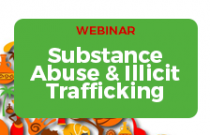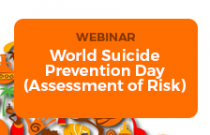Management of Sexually Transmitted Diseases
Dr Daniel Kaonga
This lecture will discuss some common sexually transmitted diseases, their diagnoses and management guidelines.
Schizophrenia Month Frontline Webinar
Dr. Delali Fiagbe, Dr. Pearl Adu-Nyarko and Dr. Delali Fiagbe
Schizophrenia Case Study Discussions & Best Practice Sharing
Substance Abuse and illicit trafficking
Dr. Susan Kinyek
Learn about how how corruption can impact efforts to address substance abuse within healthcare systems, how it may lead to the provision of substandard or ineffective treatment for substance abuse and thrive in environments where there is a lack of oversight and accountability.
ACMT Activities
Gloria J. Baciewic and Timothy J. Wiegand
These enduring webinars are written and presented by physicians board-certified in medical toxicology and others with recognized expertise in the specialty. Many of them are presented in a moderated case-based discussion.
Affordable and Quality Primary Health Care Services
Rachel Ambalu
Kenya has committed to accelerate the attainment of UHC which aims at ensuring that all Kenyans access and receive essential quality health services without suffering financial hardship. UHC Kenya recognizes the digitization of health information systems to obtain real-time data to inform decision-making for patients. From 2017....
Ethical Issues in the Care of the Older Persons
Miriam Carole Atieno Wagoro
With advancements in healthcare technology, the population of older persons is increasing. The dependent nature of the older person, chronic life-limiting conditions and the imminence of death raise special health and ethical concerns in their care. The lecture on "Ethical Issues in the Care of Older Persons" will focus on the e....
Bereavement Care in Maternity
Lauren Petrie
A presentation to discuss maternity bereavement care. Discussion points around current practice, education, effects on women and families following pregnancy loss including mental health.
Mental Health and Wellness in Primary Care
Dr Tijani Oseni
Common mental health conditions in primary care and their management.
Ultrasound - Abdominal
Peter Cantin, Glenda Toach, Zahir Amin, Douglas Pendse, Jane Smith, Pamela Parker, Karen Heggs, Angela Rogers, Simon John, Freeman, Hazel Edwards, Bob Jarman, Jane Belfield, Steven Powell, Terry Humphrey, David Horton, David Lewis
These sessions consider the role of ultrasound in investigating thoracic and abdominal conditions and discusses its value alongside other imaging modalities. General anatomy is reviewed along with normal appearances, normal variants and common abnormalities. Tips on equipment use, technique and reporting will be offered. Anat....
Holistic And Integrated Approach to Giving Newborns the Best Start to Life
Dr Mercy Wanjala
The eco-bio-psycho-social-spiritual model integrates various dimensions of human experience, emphasizing the importance of a holistic approach to health. This model is particularly relevant in ensuring newborns have the best start in life, focusing on prenatal, natal, and postnatal periods. The connection between the health of t....
Pathology of Cervical Cancer
Dr Kay Park, Dr Nadeem Abu-Rustum and Prof Edwin Wiredu
- Update on Modern Surgical Approaches for Stage I Cervical Cancer Describe the evolution of precision surgery in stage I cervical cancer with selection criteria for conservative surgery and sentinel node mapping - Cervical Cancer: A Practical Approach to Measuring Tumor Size and Differentiating HPV-Associated from HPV-Indep....
Nursing program accreditation and its quality implication
Dr. Mignote Hailu
Accreditation in nursing programs is a critical process that ensures educational institutions meet established quality standards, which directly impacts the quality of nursing education and, consequently, healthcare delivery. Creating discussion , engaging nurse educators and accreditors in this area Of nursing
Pharmacy Professionals
Tim Peel, Martine Meyer, Joanne Droney, Anna-Marie Stevens, Saskie Dorman and Lara Alloway
This learning path is designed to support pharmacy professionals when dispensing medications to manage symptoms in people near the end of life.
Logistics and Supply Chain in Pandemic Situations
Mr Kondwani Shaba
Pandemics are large-scale outbreaks of infectious disease that can greatly increase morbidity and mortality over a wide geographic area and cause significant economic, social, and political disruption. Evidence suggests that the likelihood of pandemics has increased over the past century because of increased global travel and in....
The Ideal Short-acting Muscle Relaxant
Elizabeth Flockton and Chris Parker
This session identifies those properties of a neuromuscular blocking agent that would make it an ideal short-acting muscle relaxant. The properties of currently available agents will be compared with those of the ideal agent using relevant clinical scenarios.
The Neuromuscular Junction and the Nicotinic Acetylcholine Receptor
Sue Hill
This session provides an overview of the structure and function of the skeletal neuromuscular junction. It identifies sites at which drugs and toxins interrupt signal transmission between motor nerves and the mechanism of excitation-contraction coupling.
Community MIYCAN Training Course
Jjemba Vicent Michael, Dr. Joel Tenywa, and Ms. Elizabeth Kiconco
Maternal, Infant, and Young Child Nutrition (MIYCN) course focuses on Maximizing Impacts on Child Growth and Micronutrient Status by Focusing on Maternal Nutrition, Delivery Practices, and Improved Infant and Young Child Feeding.
World Suicide Prevention Day (Assessment of Risk)
Miss Abena Otchere-Darko
World suicide prevention day is an awareness day always observed on 10 September every year, in order to provide worldwide commitment and action to prevent suicides. An estimated 18 people a day take their own life and for every suicide, there are likely 20 other people making a suicide attempt, and many more have thoughts of se....
Healthcare Ethics Certificate Program
Francis Ward, Kim Mooney-Doyle, Debra Lynn Bastien, Fiona Timmins, Vivian Norman, Amy M. Haddad, Ifeanyi Madujibeya, Teresa Villaran, Carol Taylor, Marion E. Broome, Mary Cipriano Silva, Barbara E. Berger, Norma Rolfsen, Valerie Swigart, Dougl
This program examines key ethical issues, terms, concepts, and ideas that can become aneveryday part of nursing practice. Reflective and guided exercises focused on personalphilosophy, values, and working through ethical issues to help clarify when an ethical dilemmaexists, what ethical issues are involved, and how an ethical po....
Spinal Nursing: Autonomic Dysreflexia
Tracey Tattam
Autonomic Dysreflexia is considered a life threatening situation for a person with a spinal cord injury (SCI) above the Thoracic level of T6. The person with SCI experiences elevated blood pressure (BP) 20mmHg or more than their normal BP. Many nurses can implement simple measures they can take to assist with the management of t....
Making Music Accessible
Dr Tanya Silveira
This session will focus upon the multiple and simultaneous benefits of musical engagement in rehabilitation. The presentation itself will be centred upon the importance of the lived experiences of people who are in rehabilitation, along with a brief overview of the research to support this. Delegates will also be encouraged to e....
FIM Documentation Update
Sarah Potter
There have been some recent changes to the FIM scoring system around bladder and bowel. Sarah will provide an overview of what they are and how to score these 2 sections.
FIM Update
Sarah Potter
A brief FIM update to refresh you on the changes around Bladder and Bowel management and a brief introduction to the FAM (Functional Assessment Measure) that is being used for Rehab In The Home (RITH) dataset.
























